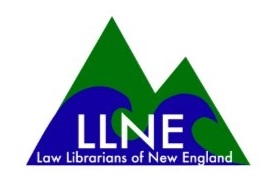Save the date and join us for the Fall LLNE Meeting!
Friday, November 3, 2023
The Fog of War:
Foreign and International Legal Research in Today’s World
Hosted by Northeastern University School of Law Library
Save the date and join us for the Fall LLNE Meeting!
Friday, November 3, 2023
The Fog of War:
Foreign and International Legal Research in Today’s World
Hosted by Northeastern University School of Law Library
Job Opening – Law Library Assistant – Essex Law Library
Salem, Massachusetts
Full-time
Closing on: September 11, 2023, at 23:55 EDT
Title: Law Library Assistant
Pay Grade: Grade 13
Starting Pay: $ 54,593.18
Departmental Mission Statement: The Court Services and Law Libraries Department is responsible for providing key court services to
support the administration of justice and advance access to justice in the Trial Court. These services include the Court Service Centers, the Trial
Court Law Libraries, and the Judicial Response System.
MISSION STATEMENT OF THE MASSACHUSETTS TRIAL COURT LAW LIBRARIES:
The Trial Court Law Library System provides timely, efficient access to current and historical law-related information in an impartial and
respectful manner to anyone needing legal information.
ORGANIZATIONAL PROFILE:
This circuit position requires travel and entails working in multiple locations, including the Lowell, Essex, and Middlesex Law Libraries,
and will be based in the Lawrence Law Library.
This position is designated as a union position and is covered by the Collective Bargaining Agreement with O.P.E.I.U., Local 6.
Position Summary: Major duties are performed under the direction of the Head Law Librarian and include processing incoming library materials, preparing fiscal documents, providing general and legal information, and implementing circulation and interlibrary loan policies. The Law Library Assistant assists the Head Law Librarian in system-wide activities such as long-range planning, electronic library services, and special projects, and may be assigned by the Law Library Department to perform Law Library Assistant duties in other libraries as needed. In the absence of the Head Law Librarian and other law library staff, maintains the day-to-day operation of the law library.
Major Duties: Law Library Assistant Duties:
Minimum Requirements: These are the minimum requirements necessary to apply for the position of Law Library Assistant:
Law Library Assistant I Requirements: Bachelor’s degree AND one (1) year of full-time experience as a paid paralegal OR one (1) year of full-time paid clerical experience in a law library OR An equivalent combination of education and experience.
Interested persons should visit https://trialcourtjobs.mass.gov/jobs/2c79266c-b772-4dd6-9e44-30c7ef66ed3d to file an application.
Hello Members,
Welcome to our new members! I wanted to start off by saying thank you to our committee chairs for all their work over the past year, and to all our members who are volunteering their time by serving on the LLNE committees.
I’d like to give a special thank you to Michael VanderHeijden, who has rotated off the board after serving as immediate past-president. Michael also served as chair to the Ad Hoc Strategic Planning Committee and as a member of the Bylaws Committee. Another special thank you to Anna Lawless-Collins, who has served as president over the past year; because of Anna’s time as president we now have a strategic plan and have implemented a mission statement and goals.
I’d like to welcome Nicholas Mignanelli to the Education Committee this year, who will be serving with Jessica Panella. Be on the lookout for emails about the Fall meeting coming to your inbox soon. Last, but certainly not least, I’d like to welcome Maureen Quinlan as Vice President/President-Elect! I look forward to working with Marueen over the course of this year.
As I have taken time to reflect on my own time within LLNE, I’ll never forget the warm and kind welcome I received as a new member. It was a chaotic time for me as I was gearing up for law school finals. I walked into my first Access to Justice/Service Committee meeting not knowing anyone in the room. We met at a member’s home (whom I also did not personally know). The librarians I met that day welcomed me in a way I hadn’t experienced before. I know I had found my place.
I hope that this next year brings you joyful reflection on the great work we are doing in LLNE to support each other and our communities. Please consider volunteering for a committee or leadership role within LLNE.
Be well,
Sara
We welcome Maureen Quinlan as the Vice President/President-Elect and Nicholas Mignanelli as the co-Education Director. We’d also like to congratulate Rachel Weiss for being re-elected LLNE treasurer.
LLNE’s 2022-2023 year wrapped up with a great Spring meeting on the NextGen Bar exam. New England School of Law Boston put on an excellent, informative program that raised money for three different scholarship funds to help students studying for the bar.
The LLNE Strategic Planning committee is off and running to define our goals and objectives for the next few years. We will have a mission statement and goals defined in time for Sara’s year as president to begin. The Ethical Principles committee is also getting started and will implement the ethical principles LLNE agreed to last year. The Bylaws committee wrapped up its work this year and the updated bylaws were officially adopted at the Spring meeting.
All the LLNE committees had a wonderful year; look for the upcoming Annual Report to summarize committee activities for the year. Thank you all for another productive year in LLNE!
Anna Lawless Collins, BU Law, outgoing LLNE President
Sara Monalea McMahon, Hampshire Law Library, incoming LLNE President
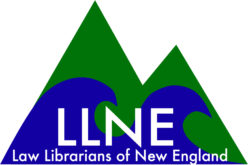
Salem, Massachusetts
Full-time
Closing on: September 11, 2023 at 23:55 EDT
Title: Law Library Assistant
Pay Grade: Grade 13
Starting Pay: $ 54,593.18
Departmental Mission Statement: The Court Services and Law Libraries Department is responsible for providing key court services to
support the administration of justice and advance access to justice in the Trial Court. These services include the Court Service Centers, the Trial
Court Law Libraries, and the Judicial Response System.
MISSION STATEMENT OF THE MASSACHUSETTS TRIAL COURT LAW LIBRARIES:
The Trial Court Law Library System provides timely, efficient access to current and historical law-related information in an impartial and
respectful manner to anyone in need of legal information.
ORGANIZATIONAL PROFILE:
This circuit position requires travel and entails working in multiple locations, including the Lowell, Essex, and Middlesex Law Libraries,
and will be based in the Lawrence Law Library.
This position is designated as a union position and is covered by the Collective Bargaining Agreement with O.P.E.I.U., Local 6.
Position Summary: Major duties are performed under the direction of the Head Law Librarian and include processing incoming library materials, preparing fiscal documents, providing general and legal information, and implementing circulation and interlibrary loan policies. The Law Library Assistant assists the Head Law Librarian in system-wide activities such as long range planning, electronic library services, and special projects, and may be assigned by the Law Library Department to perform Law Library Assistant duties in other libraries as needed. In the absence of the Head Law Librarian and other law library staff, maintains the day-to- day operation of the law library.
Major Duties: Law Library Assistant Duties:
Minimum Requirements: These are the minimum requirements necessary to apply for a position of Law Library Assistant:
Law Library Assistant I Requirements: Bachelor degree AND one (1) year of full-time experience as a paid paralegal OR one (1) year of full-time paid clerical experience in a law library OR An equivalent combination of education and experience.
Interested persons should visit https://trialcourtjobs.mass.gov/jobs/2c79266c-b772-4dd6-9e44-30c7ef66ed3d to file an application.
Lawrence, Massachusetts,
Full-time
Closing at: May 31 2023 at 23:55 EDT
Title: Circuit Law Librarian – Northeast
Pay Grade: Grade 17
Starting Pay: $73,753.54
Departmental Mission Statement: The Court Services and Law Libraries Department is responsible for providing key court services to
support the administration of justice and advance access to justice in the Trial Court. These services include the Court Service Centers, the Trial
Court Law Libraries, and the Judicial Response System.
MISSION STATEMENT OF THE MASSACHUSETTS TRIAL COURT LAW LIBRARIES:
The Trial Court Law Library System provides timely, efficient access to current and historical law-related information in an impartial and
respectful manner to anyone in need of legal information.
ORGANIZATIONAL PROFILE:
This circuit position requires travel and entails working in multiple locations, including the Lowell, Essex, and Middlesex Law Libraries,
and will be based in the Lawrence Law Library.
This position is designated as a union position and is covered by the Collective Bargaining Agreement with O.P.E.I.U., Local 6.
Position Summary: Working within the Trial Court Law Libraries, the Circuit Law Librarian – Northeast performs professional library duties
over a defined geographic area in the following areas: legal research and reference, cataloging, interlibrary loan, bibliographic services and
acquisitions. Assists Head Law Librarians in library operation; and may perform specific functions for the Trial Court Law Library system such
invoice processing, collection development and maintaining a federal depository collection; performs related work as required.
Supervision Received: Work is performed primarily under the direction of the Director of Court Services and Law Libraries and Manager of
Law Libraries, or their designee, and is evaluated for professional soundness and conformity to policy.
Duties: • Provides reference and information services to the clientele by responding to questions either in person or by telephone, locating and
retrieving materials and assisting in legal research, by developing a comprehensive knowledge of legal bibliography and general reference
sources.
• Utilizes full knowledge of electronic databases and interlibrary sources, both legal and non-legal, to assist clientele in retrieving information
needed.
• Instructs library users in the use of library materials and equipment.
• Adapts professional principles of cataloging, classification and indexing to the various components of the library’s collection.
• Manages and maintains automated cataloging and classification through a national database.
• Works with other librarians on system-wide projects.
• Performs necessary tasks for assuring security, proper protection, care and presentation of library’ materials, and presentation of library’
materials.
• In the absence of the Head Law Librarian, maintains the day-to-day library operations; and
• Performs related duties as required.
Job Competencies: All applicants must be able, through the interview process, to demonstrate knowledge and understanding of the following
areas:
Ethics and Values: Communicates and demonstrates the ethics and values of the Trial Court and Trial Court Law Libraries as demonstrated in
the American Association of Law Libraries.
Mission: Understands, upholds, and communicates the missions of the Trial Court and the Trial Court Law Libraries.
Applied Knowledge: Demonstrates the core competencies and specialized competencies in the areas of library management; reference, research
and client services; information technology; collection development, cataloging and teaching as outlined in the AALL Competencies of Law Librarianship.
Customer Service: Conducts oneself in a courteous and professional manner towards both Trial Court employees and the public whether in
person, on the telephone or in an electronic environment.
Commitment to Diversity: Promotes an environment of diversity through understanding, respect, and positive communication with persons
of varied racial, ethnic, economic, and cultural backgrounds.
Continuous Learning: Demonstrates a commitment to continuously improving himself or herself through professional development and
actively pursues continuing education.
Minimum Requirements: These are the minimum requirements necessary to apply for a position of Circuit Law
Librarian:
• Master’s Degree in Library Science or Law Degree from an accredited library school and 1 full year of full-time experience in a professional
capacity in a law library; equivalent combinations of education and experience will be considered for meeting the minimum qualifications.
• Preferred Qualifications: MLS, MLIS, or JD and some library and legal research experience;
• Knowledge of theory, principles and practices of library science and law library administration, including current methods and procedures in
such areas as collection development, cataloging and legal research and reference;
• Strong interpersonal skills and the ability to deal effectively and respectfully with people;
• Ability to work with judges, attorneys, court personnel;
• Ability to use computer applications such as MS Office spreadsheets, text editing and publisher programs;
• Ability to communicate clearly and effectively in both oral and written form;
• Ability to reach with hands and arms, bend, crouch, lift materials weighing up to 30 pounds, and climb stairs; and
• Ability to travel within the Commonwealth and work at other Trial Court Law Library locations when necessary.
https://trialcourtjobs.mass.gov/jobs/circuit-law-librarian-northeast-lawrence-massachusetts-united-states
The LLNE Nominations Committee is pleased to announce the slate of candidates for the upcoming election at our next annual meeting. All candidates have been approached and are willing to serve. The slate is as follows:
Vice-President/President Elect:
Maureen Quinlan
Reference & Gov. Doc. Law Librarian
Garbrecht Law Library
University of Maine School of Law
246 Deering Avenue
Portland, ME 04102
(207) 780-4835
maureen.quinlan@maine.edu
Treasurer:
Rachel Weiss
Research Librarian
Nixon Peabody LLP
53 State St.
Boston, MA 02109
(617) 345-6141
rweiss@nixonpeabody.com
Education Director:
Nicholas Mignanelli
Head of Library Programming and Lecturer in Legal Research
Lillian Goldman Law Library
Yale Law School
127 Wall St.
New Haven, CT 06511
(203) 432-8153
nicholas.mignanelli@yale.edu
LLNE Nominations Committee:
Barbara Schneider, Chairperson
Mindy Kent
George Taoultsides
The Moakley Law Library is a gem in the heart of Boston. If you ever find yourself strolling down the Boston Common near the Park Street T stop, look up! You’ll see Sargent Hall – a curved building, right beside the Orpheum Theatre. The Moakley Law Library is right at the tippity-top, on the sixth and seventh floors. The views are breathtaking – especially at sunset. From most windows that face Tremont Street, you can marvel at the sparkling gold dome of the State House building, that’s just a 2-minute walk from the law school. In the distance, you can see the Charles River, the Prudential & John Hancock buildings, and the iconic Citgo sign. History buffs adore our location – the law school is directly across from the Granary Burying Ground, where Samuel Adams, Paul Revere, John Hancock, James Otis, five victims of the Boston Massacre, including Crispus Attucks, Mother Goose and Benjamin Franklin’s parents lay at rest. From the imposing white tower church bell to the changing of the seasons, Suffolk’s views are one of a kind, especially at sunset.

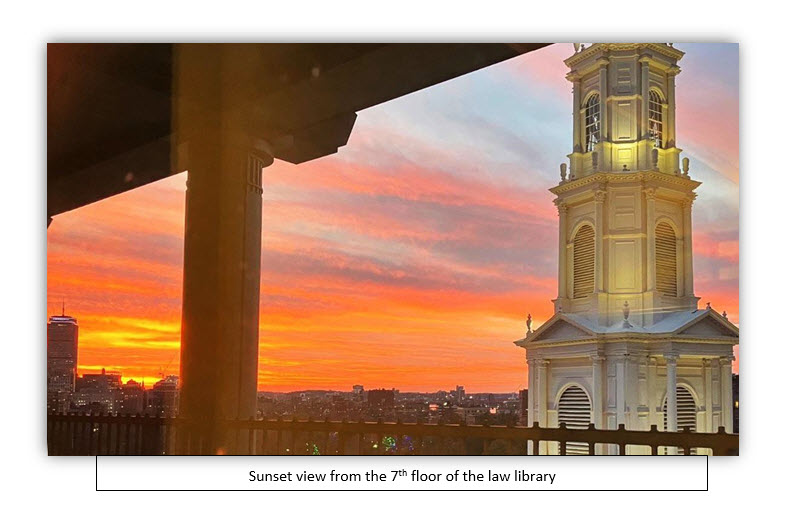
Speaking of one of a kind, let’s talk about the Moakley Law Library’s staff. They are a collaborative team of experts in their respective areas who inspire, encourage and support each other daily to provide the highest level of support to the law school community. In addition to the director of the law library & associate professor of legal research, and the assistant director for public services, there are four legal research librarians and seven other law library admin and staff members. Some of the legal research librarians wrote an AALL Spectrum article together, highlighting the innovative trainings they offer to law students that are about to begin first year summer internships.
Mindful of diverse studying habits, we devised a plan to arrange the law library space into a welcoming environment for all. Students can decide if they want quiet studying, collaborative interactions, or even low tone videoconferencing. There are also many large and small study rooms for students who want a more private environment for studying and collaborating. Both day and evening students are at the core of our services. The librarians launched a quarterly law student e-newsletter to promote library services, legal research instruction, new resources, a funtivity, and more. To foster community year-round, the law library designed outreach activities such as a kindness mural, where students write positive or encouraging messages to fellow classmates; a succulents garden, where the plants were named after past justices; and a find-the hidden-object game with a law theme.
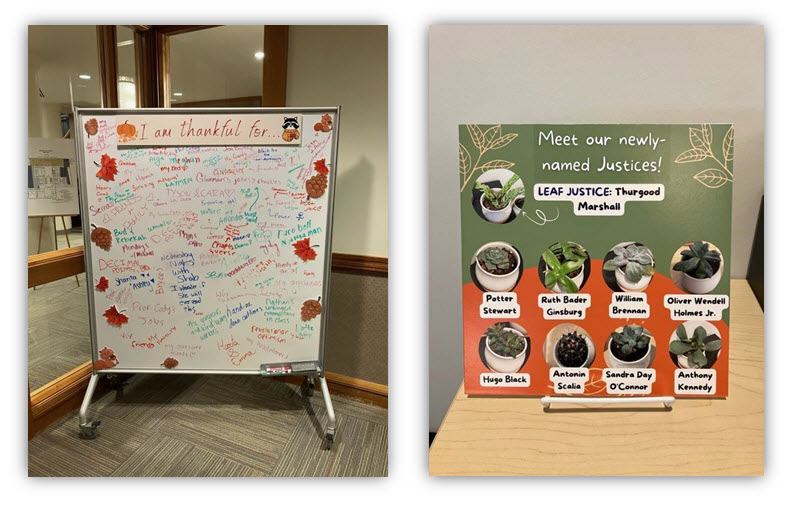
The law library is always looking for ways to support the law school community and bring people together. We recently transformed a seldom used elevator lobby on the 7th floor and are excited to launch our very first gallery exhibit to celebrate Suffolk Law history and pride. The exhibit includes two interactive elements and lots of really cool archival photos of Suffolk Law from its inception at the beginning of the 1900s – thru the 1980s.
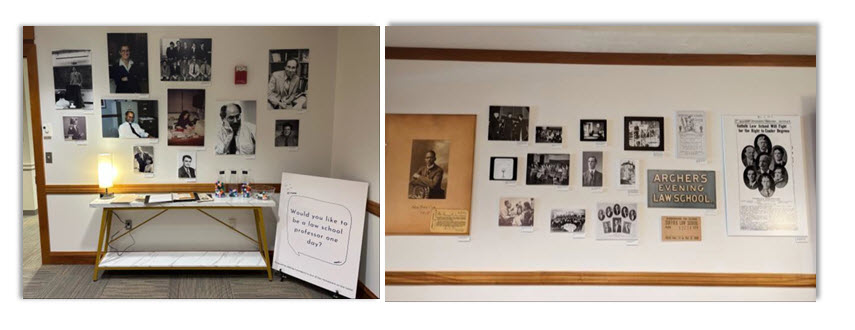
The Suffolk Law faculty are prolific scholars. The Moakley Law Library designed a faculty library liaison program to assign a legal research librarian to each full-time faculty member to help ensure that they get the customized support they need for all their scholarly and teaching endeavors. The law library also helps ensure faculty success by working with the Vice Dean of the law school to play a leading role in managing the paid Faculty Research Assistant program, which allows law students the opportunity to work alongside law faculty on significant research projects and writing.
Embracing diversity, equity, and inclusion is a cornerstone of Suffolk Law, which advocates for acceptance and systemic change. This informs its curricular design, making Suffolk Law a national leader in key areas from legal writing to legal technology.
Librarians play a significant role in the classroom – teaching two week-long legal research modules every fall, as part of the first-year legal research and writing curriculum, offering 2-credit advanced legal research classes every spring and fall, and visiting upper-level classes to provide trainings and support to students who are working on legal research papers. The law library also offers workshops and trainings – like the Bluebook refresher training that we offer every spring for first-year students who are about to participate in the law review write-on competition.

If you’d like to learn more about the innovative things we’re doing at Suffolk, please don’t hesitate to reach out – we’d love to chat, tell you more, and learn about all the great things your law library is doing too – and we’d be happy to schedule a tour of the law library with you.
Good afternoon LLNE! We want to congratulate Boston College Law Library and Western New England School of Law Library for winning the Excellence in Community Engagement Award from AALL! See the information below:
EXCELLENCE IN COMMUNITY ENGAGEMENT AWARD
Boston College Law Library
Newton Centre, Massachusetts
Social Media: A Method to Increase Engagement for Library Services
AND
Western New England University School of Law Library
Springfield, Massachusetts
Introduction to Law Collaboration with Paulo Freire Social Justice Charter School
Way to represent LLNE!
